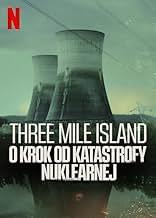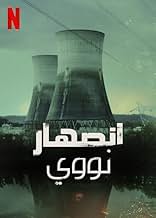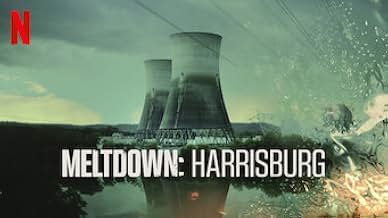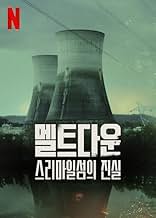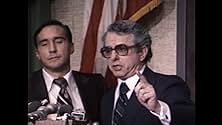Panique à la centrale: Three Mile Island
Titre original : Meltdown: Three Mile Island
La quasi-catastrophe de la centrale nucléaire de Three Mile Island. Un lanceur d'alerte qui s'est prononcé pour protéger la communauté. Les événements, les controverses et les effets du pire... Tout lireLa quasi-catastrophe de la centrale nucléaire de Three Mile Island. Un lanceur d'alerte qui s'est prononcé pour protéger la communauté. Les événements, les controverses et les effets du pire accident nucléaire de l'histoire des États-Unis.La quasi-catastrophe de la centrale nucléaire de Three Mile Island. Un lanceur d'alerte qui s'est prononcé pour protéger la communauté. Les événements, les controverses et les effets du pire accident nucléaire de l'histoire des États-Unis.
- Récompenses
- 5 nominations au total
Parcourir les épisodes
Avis à la une
Whoever produced this documentary clearly doesn't like nuclear power. Nearly every single interview & pundit gives an anti-nuclear biased account. The primary pundit (and only employee of TMI) is a disgruntled former employee who fell in love with an anti-nuclear campaigner in the middle of this thing, and greatly over-dramatises his account. A lot of focus is also put on near-clueless residents of the nearby town, who are quite irritating with their over-acted "minute of fame" accounts, and blame every rash on their butt on the incident. They certainly deserve to be heard, but shouldn't be used as replacements for educated voices. And there are barely any educated voices in this documentary. No international opinions, no voices from the current nuclear industry, no industrial safety experts, zero defence or applause of the actions taken by highly skilled people which probably saved many lives, zero mention of the fact the design of the facility worked exactly as it should and prevented a release, and no mention of the vastly improved safety record of the industry. The whole thing is accompanied by cheesy dramatic music to build tension and doom. It's a step down from Netflix's usual standard for documentaries - like something from 15 years ago - and certainly doesn't touch Chernobyl for viewing intrigue. In fact, Chernobyl probably does a better job documenting the incident, and it's not even a documentary.
I'm sure they were all virologists this morning and climate scientists in the afternoon.
I was eight years old when TMI happened. We lived in Mechanicsburg, PA, 18 miles away - - can remember getting picked up from school out of the blue by my parents and riding to my aunt and uncle's in Allentown. Part of the documentary is about that unknown and just how worrisome it was for those who lived in South Central PA.
For those who say there weren't any "experts" heard from in the documentary, I'm not sure what they were watching. It's pot calling kettle black for everyone who is claiming bias with the film - - multiple experts are interviewed, but obviously not ones such reviewers want to hear from. It does spend most of the time in the later episodes with the whistleblower. It has a point of view. Other than that, the complaints are what is overblown, not the story of TMI as rendered here.
I was eight years old when TMI happened. We lived in Mechanicsburg, PA, 18 miles away - - can remember getting picked up from school out of the blue by my parents and riding to my aunt and uncle's in Allentown. Part of the documentary is about that unknown and just how worrisome it was for those who lived in South Central PA.
For those who say there weren't any "experts" heard from in the documentary, I'm not sure what they were watching. It's pot calling kettle black for everyone who is claiming bias with the film - - multiple experts are interviewed, but obviously not ones such reviewers want to hear from. It does spend most of the time in the later episodes with the whistleblower. It has a point of view. Other than that, the complaints are what is overblown, not the story of TMI as rendered here.
A few years after the meltdown, I was working for Air Products and Chemicals, an industrial gas company as a sales rep out of York, PA. TMI was my account and I went up there to do a cylinder count as they were paying thousands a month in rental charges for 5000 cylinders that had been on the island for 10 or more years. After my walk through I found only 200 cylinders. Big mystery until I talked to an old timer at the plant. Seems at the time of the meltdown and thereafter, employees would take full cylinders with 3000 psi, over to an embankment overlooking the Susquehanna River, lay them across two railroad ties and then knock the heads off the cylinders with a sledgehammer shooting them out over the the river a few hundred feet. These were the people running the plant.
I didn't feel like this was about fear in nuclear energy. This event set it back, but it's still viable and prevalent. This is about human error, regulation failure, and high level corporate and government corruption.
The main individual that this documentary centers around is Richard ("Rick") Parks. He was a nuclear engineer hired as part of the clean-up operation at Three Mile Island. As he unequivocally says at the beginning and end of the series, he's a believer in nuclear energy. He is a proponent.
What he's not a believer in, after his experience, is putting nuclear safety in the hands of private enterprise. The pressures to be profitable (or avoid losses) can force lapses in safety ... and that should never be on the table.
As far as a documentary is concerned, it's "ok". It lags a lot in the middle and didn't have much in the way of counterpoint experts. However, because it compiled and presented a lot of interesting information about the incident that I knew little about ... I have to give it credit. The idea that there was a second potential disaster involved (the polar crane operation) - was truly eye-opening.
As far as the downsides - there wasn't a lot of counterpoint from nuclear experts. This is understandable. From friends I have in the industry, they tell me the nuclear industry is a small community. If your name gets associated with anything anti-industry, the professional hit could be a career ender. Still, it would have been nice to see more scientific experts presented ... esp. If they had counterpoint ideas.
A fun fact they showed was that Pres. Jimmy Carter was a nuclear engineer and was once involved in repairing a damaged reactor himself. He showed up at Three Mile Island to calm tensions and support the industry.
Near the beginning I wondered if this would have been more interesting as a dramatization, like the Chernobyl mini-series. However, after a while, I understood why this may have been better as a documentary. The story they tell is more of disasters being averted ... which is great, but different than the stories of Chernobyl, Titanic, etc.
All in all - it's an interesting watch. The world is a bit different today than in 1979; there's a focus on solar, wind and even the sea for new sources of power. If they don't pan out soon, interest may eventually refocus on nuclear energy.
If you want nuclear accident suspense, watch "The China syndrome" and "Chernobyl". If you want whistleblower drama, watch "Silkwood" ... and (though it's a documentary) this series.
What he's not a believer in, after his experience, is putting nuclear safety in the hands of private enterprise. The pressures to be profitable (or avoid losses) can force lapses in safety ... and that should never be on the table.
As far as a documentary is concerned, it's "ok". It lags a lot in the middle and didn't have much in the way of counterpoint experts. However, because it compiled and presented a lot of interesting information about the incident that I knew little about ... I have to give it credit. The idea that there was a second potential disaster involved (the polar crane operation) - was truly eye-opening.
As far as the downsides - there wasn't a lot of counterpoint from nuclear experts. This is understandable. From friends I have in the industry, they tell me the nuclear industry is a small community. If your name gets associated with anything anti-industry, the professional hit could be a career ender. Still, it would have been nice to see more scientific experts presented ... esp. If they had counterpoint ideas.
A fun fact they showed was that Pres. Jimmy Carter was a nuclear engineer and was once involved in repairing a damaged reactor himself. He showed up at Three Mile Island to calm tensions and support the industry.
Near the beginning I wondered if this would have been more interesting as a dramatization, like the Chernobyl mini-series. However, after a while, I understood why this may have been better as a documentary. The story they tell is more of disasters being averted ... which is great, but different than the stories of Chernobyl, Titanic, etc.
All in all - it's an interesting watch. The world is a bit different today than in 1979; there's a focus on solar, wind and even the sea for new sources of power. If they don't pan out soon, interest may eventually refocus on nuclear energy.
If you want nuclear accident suspense, watch "The China syndrome" and "Chernobyl". If you want whistleblower drama, watch "Silkwood" ... and (though it's a documentary) this series.
Le saviez-vous
Meilleurs choix
Connectez-vous pour évaluer et suivre la liste de favoris afin de recevoir des recommandations personnalisées
- How many seasons does Meltdown: Three Mile Island have?Alimenté par Alexa
Détails
- Date de sortie
- Pays d’origine
- Site officiel
- Langue
- Aussi connu sous le nom de
- Meltdown: Three Mile Island
- Sociétés de production
- Voir plus de crédits d'entreprise sur IMDbPro
Contribuer à cette page
Suggérer une modification ou ajouter du contenu manquant

Lacune principale
What is the Spanish language plot outline for Panique à la centrale: Three Mile Island (2022)?
Répondre


